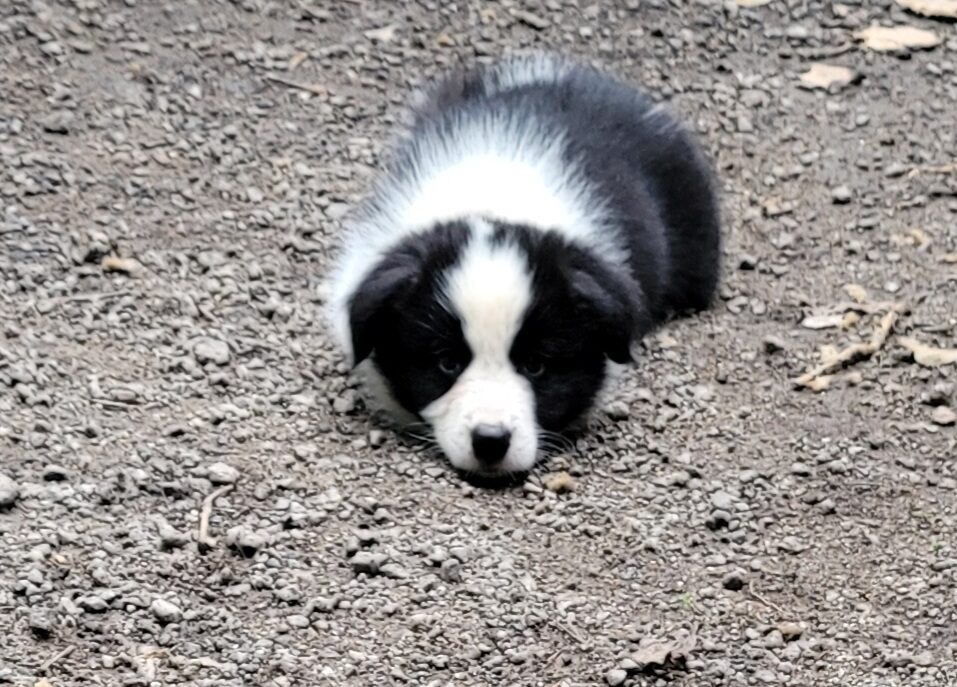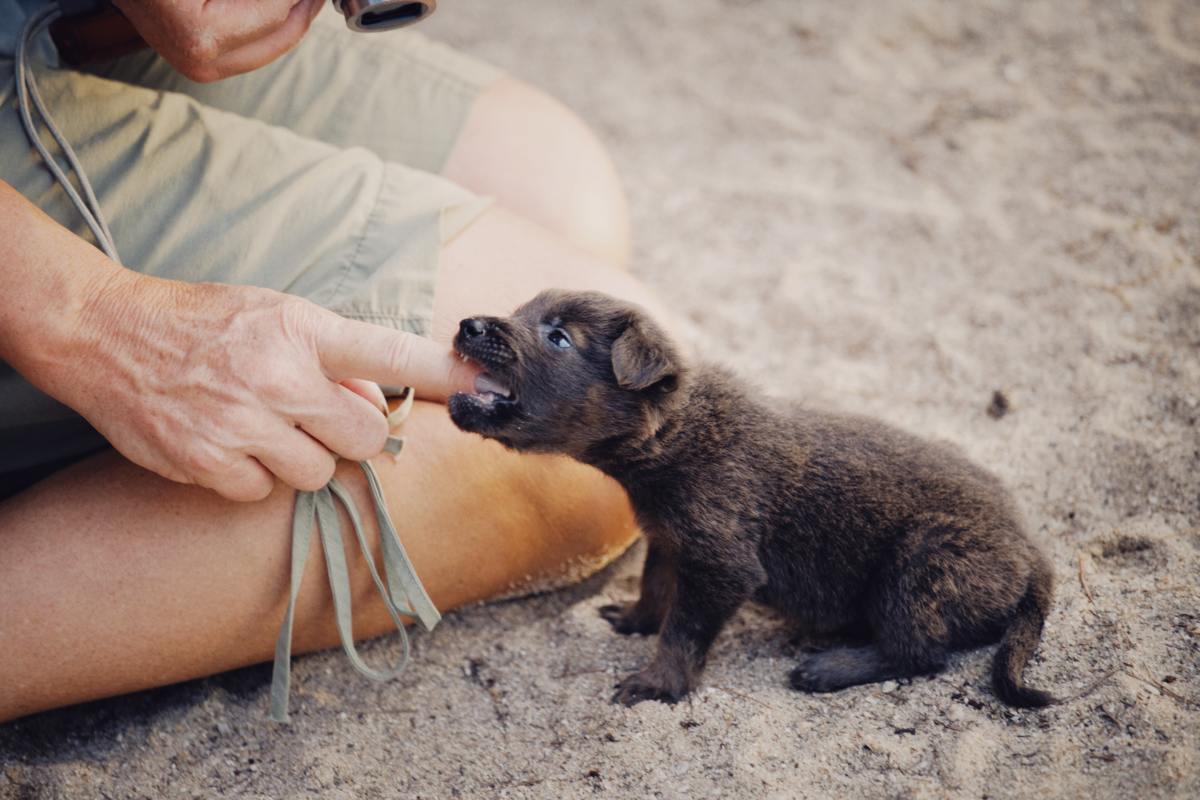Do Your Dogs Eat Dirt, Soil and Clay
Have you noticed your dog digging holes in the backyard and devouring dirt, soil, or clay? I noticed my dogs doing that last summer, and wondered, “Does this mean they have parasites? Are they missing something in their diet, or are they hungry, or just plain bored?” Then in the fall, they quit eating dirt in the backyard, until spring this year. My research on the subject yielded surprising answers to the question of “Why do dogs eat dirt”, as well as what could I do about it.
Dogs Eating Dirt, Is It Unusual
Oddly, dirt-eating is a common behavior in humans, other primates, cats, parrots, fruit bats, buffalo, and deer, as well as many other mammal species.
Why Would a Dog Eat Dirt?
1. Pica – Nutritional Deficiency
Early thoughts on why dogs eat dirt centered on the pica explanation. In humans, dirt-eating is associated with pica, a nutritional deficiency that makes people crave clay, wood (pencils), plaster, and a whole host of inappropriate items found in nature and our households.
Pica is typically the result of deficiencies in zinc and iron and can occur in people with diabetes. Pregnant women, in particular, may suffer from pica as a result of anemia. As a “nutritional supplement” soil and, in particular, red clay is naturally high in iron, pyrite, kaolinite, potassium, dolomite, and silica.
Nutritional Benefits From Eating Soil or Clay
- Iron alleviates anemia.
- Pyrite is a mineral used to create iron sulfate to treat iron deficiency.
- Kaolinite or Kaolin soothes stomach upsets and stops diarrhea (Kaopectate, Rolaids, and Maalox were originally made with Kaolin).
- Dolomite is rich in calcium carbonate and is used to treat low calcium levels, weak bones, and hypoparathyroidism.
- Potassium helps with blood pressure function, kidney function, muscle function, nerve signals, bone health, and fluid balance.
- Silica, also found in leafy greens and whole grains, silica helps re-mineralize bones, reduces joint inflammation, improves skin and coat health, and helps control cholesterol levels.
Clay eating has some health benefits when eaten in moderation. However, it is important to mention that soil often harbors parasites such as whipworms and hookworms, creating a cycle of parasitic infections.
If your dog eats dirt, get him tested for internal parasites, by your vet.
We live in Georgia, full of red clay, which the dogs relished only through the warmer months. But if they needed a nutritional boost, why didn’t they eat dirt in the fall and winter? It seemed there must be another explanation for my pack other than nutritional supplementation.
2. Boredom – Why Healthy Dogs Eat Dirt Soil and Clay
Boredom often causes dogs to dig holes in the yard. Sometimes they come upon the scent of the burrow of a chipmunk or other animal, perhaps long gone. Yet the old scent drives the digging behavior. That scent can encourage sniffing and tasting of the soil. Once this behavior becomes established, the dog may continue digging and tasting, as a way to expend excess energy.
However, manic soil consumption of large amounts of soil can cause an intestinal obstruction. Heavy loads of dirt in the intestinal tract can cause constipation and ultimately an impaction, requiring surgery. If you observe this behavior, you need to stop it, by blocking access to the favorite soil eating spot, and behavior modification.
To modify the behavior, redirect their attention and energy. Kong toys filled with frozen peanut butter occupy dogs for up to an hour. Peanut butter has Zinc, Potassium, Niacin, Folate, Vitamins E and B6. Try to buy low-fat or naturally ground peanut butter. Avoid anything with sugar substitutes in it. They can be toxic to dogs.
3. Removal of Toxins from the Intestinal Tract
Clay has a peculiar ability to bind to toxins and sweep them out of the intestinal tract. Consider how spas use mud baths to detoxify their clientele. Clay and mud bind to toxins, making mildly toxic foods edible.
Dogs who may have eaten something in the yard they should not have may need some dirt to help with a queasy stomach and to remove non-water soluble toxins. In the case of eating clay to remove toxins, this is considered an adaptive behavior. They are naturally solving a problem that we are unaware of and likely unable to address for them.
So, Why Do Dogs Eat Dirt Seasonally
My dogs were eating clay during the warmer months. This was also the time that the neighbors’ yard services were in full swing, spraying fertilizers, herbicides, and pesticides on their lawns. We lived at the bottom of a hill, and while we eschewed such services, all of the stormwater runoff pooled in our backyard.
The dogs enjoyed getting fresh water out of their dirt holes, which were also now laden with lawn chemicals. Through the landscaping months, they engaged in a cycle of imbibing rainwater mixed with lawn chemicals, and then dirt gobbling to settle their stomachs, thus removing toxins from their gut. Come winter, when the toxins were no longer being sprayed, the behavior was extinguished.
What to Do When Dogs Eat Dirt Soil or Clay
Parasitic Infestations
If your dog eats dirt year-round, it is important to get him checked for parasites by your vet. Pale gums and tongue indicate a hookworm infection. If he does have parasites, you will need to go on a round of dewormers and yard treatments, to kill the eggs or spore in your yard. If your dog has a particularly heavy load of hookworms, your vet may also recommend an iron-rich diet and prescribe an antibiotic, such as metronidazole, to help with potential anemia, which can occur when the hookworms release from the intestines.
The release of the hookworms can cause intestinal bleeding. Dogs who are already anemic can face a life-threatening situation when dewormed. In extreme cases, dogs can pass a blood clot and die after worming.
How to Get Rid of Parasites in Your Soil
The ultimate cure for parasites in the soil is to remove one foot of soil and replace it with uncontaminated dirt. A fairly impractical solution in any situation.
Bleach and quicklime work well to reduce the load of parasites in the soil, however they both will kill landscaping. Borax and salt will also kill parasites in the soil and are less caustic on dog paws than quicklime and chlorine. If parasites have been the cause of soil eating, removing the intestinal infestation will help break the cycle of dirt eating and re-infestation. Keep an eye on your dog when he is out. Redirect his attention, if he begins digging or dirt-eating again.
Nutritional Deficiency Dirt Eating
If your dirt-eating dog is older, discuss potential deficiencies, that may be driving the behavior with your vet while testing for parasites.
Older dogs with skin, joint, bone, or yeast issues will benefit from chondroitin and glucosamine supplements, as well as probiotics. Supplements that naturally boost Iron, Zinc, and Calcium deficiencies can stop dirt eating for nutritional reasons. Basic blood work by your vet indicates if there is a kidney function issue or diabetes present.
Natural probiotics, such as kefir, can rebalance the canine gut flora. Probiotics improve joint inflammation, skin conditions (seborrhea and bald spots), allergies (paw chewing), nervous systems, and diarrhea. Kefir is also anti-tumor which helps defeat certain cancers dogs are prone to.

Limit Toxicity for Dirt-Eating Dogs
Even dogs who don’t eat dirt can pick up toxic chemicals through their paws, especially if they have been paw chewing, due to allergies. While it is typically not possible to control your neighbors’ use of lawn chemicals, you can reduce the amount of toxic chemicals you put in the yard, where you turn your dog out.
There are an increasing number of lawn care companies utilizing non-toxic sprays, to maintain lawns. So try using natural herbicides, and fertilizers (mulched shavings from horse stables). On walks limit the amount of time your dog spends walking in other front yards. Be especially careful when a flag is planted in the yard, to warn of a recent chemical treatment. Use pet wipes to clean your dog’s paws when you return from your walks.
Final Thoughts:
When it comes to dirt eating, a dog may eat dirt for innocent reasons, such as boredom or a learned behavior. They do learn the behavior from other dogs who enjoy a dirt snack. In any case, when you observe this behavior, it is wise to check for parasites at your vet. No one wants a parasite farm in the backyard.
In other cases, dogs eat dirt for more medically concerning reasons. Some canines have a nutritional deficiency caused by a medical condition such as diabetes and kidney disease. Others due to a leaky gut, disturb the metabolism of nutrients in their food.
Elderly dogs may be in need of supplements to ease muscle and joint pain, in which case you need to seek joint supplements, with naturally occurring chondroitin and glucosamine (easily found in raw chicken feet at Asian markets) or Ark Naturals joint chews made from sea cucumbers. Naturally occurring supplements are always the easiest for dogs to absorb.




